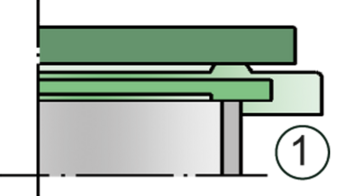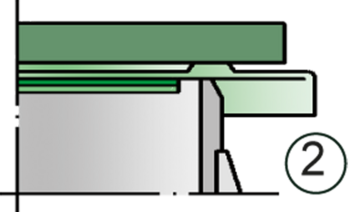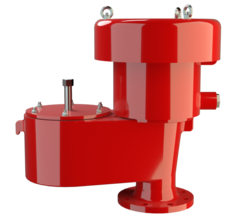VD/SV-AD, VD/SV-ADL
Pressure/Vacuum Relief Valve atmospheric deflagration-proof
- 10% technology for minimum pressure increase up to full lift
- extreme tightness, resulting in lowest possible product losses and reduced environmental pollution
- due to 10% technology, set pressure is close to opening pressure for optimum pressure maintenance in the system as compared to conventional 40% or 100% technology
- valve opens later and closes earlier than conventional valves
- valve pallet is guided inside the housing to protect against harsh weather conditions
- can be used as a protective system in areas with potentially explosive atmospheres in accordance with ATEX
- FLAMEFILTER® provides protection against atmospheric deflagrations
- integrated PROTEGO® flame arrester unit saves space and weight and reduces costs
- PROTEGO® flame arrester unit is protected from clogging and sticky substances caused by product vapors
- minimum pressure loss of the PROTEGO® flame arrester unit
- higher flow capacity
- flameproof condensate drain
- maintenance-friendly design
- modular design enables replacement of individual FLAMEFILTER® discs and valve pallet
- best possible technology for API tanks
Función y Descripción
The deflagration proof VD/SV-AD(L) type PROTEGO® valve is a highly developed combined pressure/vacuum relief valve for high flow capacities with an integrated flame arrester unit. It is primarily used as a device for flame-transmission-proof in-breathing and out-breathing in tanks, containers, and process equipment. The valve offers reliable protection against overpressure and vacuum, prevents out-breathing of product vapor and in-breathing of air almost up to the set pressure, and protects against atmospheric deflagration. The PROTEGO® flame arrester unit is designed to achieve minimum pressure rop with maximum safety. The deflagration-proof PROTEGO® VD/SV-AD(L) valve is available for substances from explosion groups IIA to IIB3 (NEC group D to C MESG ≥ 0.65 mm).
When the set pressure is reached, the valve starts to open and reaches full lift within 10% overpressure. This unique 10% technology enables a set pressure that is only 10% below the maximum allowable working pressure (MAWP) or maximum allowable working vacuum (MAWV) of the tank. After years ofdevelopment, this typical opening characteristic of a safety relief valve is now also available for the low pressure range.
The tank pressure is maintained up to the set pressure with a tightness that is above to the normal standards due to our state-of-the-art manufacturing technology. This feature is ensured by the valve seats made of high quality stainless steel and with individually lapped valve pallets (1), or with an air cushion seal (2), in conjunction with high quality FEP diaphragm. The valve pallets are also available with a PTFE seal to prevent them from sticking when sticky substances are used and to enable the use of corrosive fluids. After the overpressure is released or the vacuum is balanced, the valve reseats and provides a tight seal.
If the set pressure is exceeded, explosive gas/product vapor/air mixtures are released into the atmosphere. If this mixture ignites, the integrated PROTEGO® flame arrester unit (3) revents flame transmission resulting from atmospheric deflagration into the tank. The vacuum side is also protected against atmospheric deflagration.
The valve can be used at an operating temperature of up to +60°C / 140°F and meets the requirements of European tank design standard EN 14015 (Appendix L) and ISO 28300 (API 2000).
EU conformity according to the currently valid ATEX directive. Approvals according to other national/international regulations on request.
Dimensiones
To select the nominal size (DN), please use the flow capacity charts on the following pages
| VD / SV-AD | VD / SV-ADL | |||
| DN | 80 / 3" | 100 / 4" | 100 / 4" | 150 / 6" |
| a | 540 / 21.26 | 565 / 22.24 | 650 / 25.59 | 760 / 29.92 |
| b | 475 / 18.70 | 575 / 22.64 | 700 / 27.56 | 855 / 33.66 |
| c | 350 / 13.78 | 350 / 13.78 | 600 / 23.62 | 600 / 23.62 |
Selección de materiales para la vivienda
| Design | A | B |
| Housing | Steel | Stainless Steel |
| Valve saets | Stainless Steel | Stainless Steel |
| Gasket | PTFE | PTFE |
| Weather hood | Stainless Steel | Stainless Steel |
| Flame arrester unit | A, B | B |
Combinación de materiales para la unidad apagallamas
| Ausführung | A | B |
| FLAMEFILTER® cage | Steel | Stainless Steel |
| FLAMEFILTER® | Stainless Steel | Stainless Steel |
Selección de materiales para la válvula de presión
| Design | A | B | C | D |
| Pressure range [mbar] [inch W.C.] | +2.0 up to +3.5 +0.8 up to +1.4 | >+3.5 up to +14 >+1.4 up to +5.6 | >+14 up to +210 >+5.6 up to +84 | >+35 up to +210 >+14 up to +84 |
| Valve pallet | Aluminium | Stainless Steel | Stainless Steel | Stainless Steel |
| Sealing | FEP | FEP | Metal to Metal | PTFE |
Selección de materiales para la válvula de vacío
| Design | A | B | C | D |
| Vacuum range [mbar] [inch W.C.] | -2.0 up to -3.5 -0.8 up to -1.4 | <-3.5 up to -14 <-1.4 up to -5.6 | <-14 up to -35 <-5.6 up to -14 | <-14 up to -35 <-5.6 up to -14 |
| Valve pallet | Aluminium | Stainless Steel | Stainless Steel | Stainless Steel |
| Sealing | FEP | FEP | Metal to Metal | PTFE |
Selección del grupo de explosión
| MESG | Expl. Gr. (IEC / CEN) | Gas Group (NEC) |
| ≥ 0,65 mm | IIB3 | C |
Tipo de bridas de conexión
| EN 1092-1; Form B1 |
| ASME B16.5 CL 150 R.F. |
Modelo y especificación
Any combination of vacuum and pressure levels can be set for the valve
The valve discs are weight-loaded.
There are two different designs:
Pressure/vacuum relief valve with housing, standard design | VD/SV-AD |
Pressure/vacuum relief valve with expanded housing | VD/SV-ADL |
Additional special devices available upon request
Settings
| Pressure: | +3.5 mbar | +35 mbar | |
| +1.4 inch W.C. | +14 inch W.C. | ||
| Vacuum: | -2.0 mbar | -35 mbar | |
| -0.8 inch W.C. | -14 inch W.C. |
Diagrama de flujo volumétrico


Los diagramas de flujo volumétrico han sido determinados con un banco de pruebas de caudal calibrado y certifi - cado por TÜV. El flujo volumétrico V. en [m³/h] y el CFH se refi eren a las condiciones estándar de referencia de aire según ISO 6358 (20°C, 1bar). La conversión a otras densidades y temperaturas están referidas en el Vol. 1: “Fundamentos Técnicos”.



